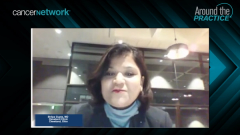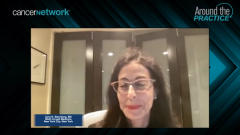
Metastatic Urothelial Carcinoma: Discussing Maintenance Therapy With Patients
Shared insight on how best to discuss maintenance therapy with patients being treated for metastatic urothelial carcinoma.
Episodes in this series

Transcript:
Peter H. O’Donnell, MD, PhD: We’re going back to the discussion of maintenance. It’s a hot topic. This question is for the audience: when do you discuss maintenance therapy with the patient? Do you do it during the initial treatment planning conversation, before you start treatment? Is it during that frontline treatment with platinum? Is it at the end of the frontline platinum treatment? Or is it sometime later? Is it only when you’re deciding to offer maintenance that you bring it up? Please choose 1. This is a tough question.
We’re seeing the vast majority of the audience, about 70%, saying that they’re discussing maintenance during that initial treatment conversation even before platinum. The remaining segments of our audience are saying they’re discussing maintenance at the end of platinum or only if they decide to offer maintenance therapy.
Let’s turn to our panel and talk about the timing of the maintenance therapy conversation. Matt, can we start with you? When do you usually bring this up?
Matthew T. Campbell, MD, MS: Yes, I try to discuss what we’re looking for when we’re starting with chemotherapy and what the plan is going to be after. Trying to set up a patient for why we’re using which drugs at which time. I discuss that we’re going to go into much more detail about immunotherapy after chemotherapy. But the game plan is just chemotherapy and then making a switch, in most instances, to immunotherapy as the next plan of action.
Peter H. O’Donnell, MD, PhD: Shilpa, when do you talk about it?
Shilpa Gupta, MD: I also broach the subject when I’m discussing frontline therapy. Patients love to hear about immunotherapy. In urothelial cancer, if they respond, they go on maintenance, which is a concept most patients like. If they don’t respond, then we also do immunotherapy. I bring that up, but I don’t go into the details until we know from the first scans what we’re going to do.
Peter H. O’Donnell, MD, PhD: Cora?
Cora N. Sternberg, MD: I agree absolutely. I discuss it earlier and earlier. In the beginning, when we’re doing the trial, we weren’t discussing it as much. But now, I discuss it earlier and earlier with patients that we plan to give certain chemotherapies and then do maintenance. People like to hear about immunotherapy. I started a woman last night with chemotherapy as an emergency. She said, “When do we do the immunotherapy?” I said, “Not yet. We just started last night.” But you know they like the idea. Then again, if they progress we’re going to give them immunotherapy.
Transcript edited for clarity.
Newsletter
Stay up to date on recent advances in the multidisciplinary approach to cancer.












































